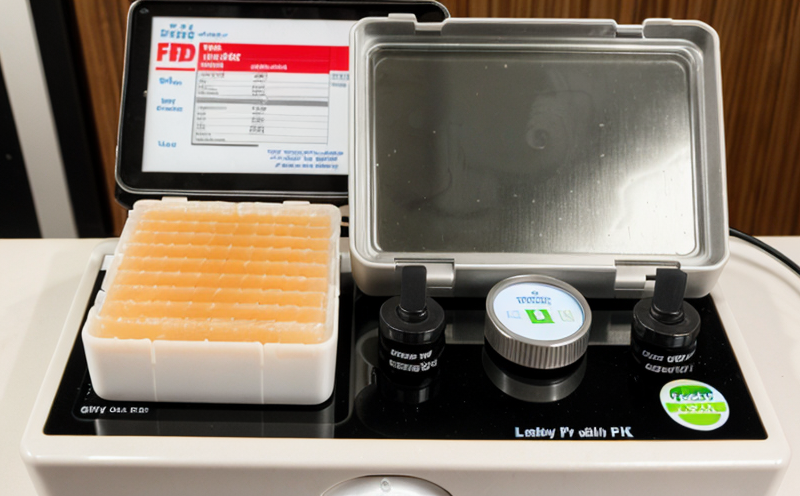EN 14214 Fatty Acid Methyl Ester Testing in Bio-Oils
The European Standard EN 14214 provides a method for determining the fatty acid methyl ester (FAME) content and profile in bio-oils. This standard is particularly important as it helps ensure consistency, quality, and compliance with regulatory requirements across the biofuels industry. Bio-oils are derived from biomass sources such as vegetable oils, animal fats, or recycled restaurant greases. They play a crucial role in renewable energy solutions by providing an alternative to traditional fossil fuels.
The standard is widely used for analytical purposes, including quality assurance and control (QA/QC), product development, and research. It specifies the procedures for extracting FAME from bio-oils using various techniques such as transesterification followed by gas chromatography (GC). The results are then reported in terms of individual fatty acid methyl esters present in the sample.
The importance of this testing cannot be overstated, especially within the context of sustainable practices and environmental regulations. Bio-fuels derived from bio-oils must meet stringent quality standards to ensure their performance meets expectations both environmentally and economically. For instance, accurate FAME determination helps optimize fuel blends for maximum efficiency while minimizing adverse impacts on emissions.
In practice, laboratories conducting EN 14214 tests follow precise protocols laid out in the standard. Specimen preparation involves careful selection of representative samples followed by meticulous extraction processes to ensure all relevant compounds are captured accurately. Once prepared, these extracts undergo gas chromatographic analysis to identify and quantify specific fatty acids.
Understanding FAME profiles is vital because they influence several key properties of bio-oils including viscosity, oxidative stability, and combustion characteristics. These factors directly impact the suitability of a particular bio-oil for various applications ranging from heating systems to aviation fuels. By leveraging EN 14214 compliant testing, stakeholders can make informed decisions about product quality and compliance with international standards.
Compliance with this standard is essential not only in Europe but globally as it supports broader sustainability goals associated with biofuels production and utilization. Regular monitoring through consistent application of EN 14214 ensures trust among consumers who rely on reliable, high-quality bio-oils for their energy needs.
The accuracy and precision achieved through rigorous adherence to EN 14214 contribute significantly towards achieving these goals. Laboratories equipped with advanced instrumentation capable of performing these tests reliably are at the forefront of delivering accurate data required by industry professionals.
Why It Matters
The accuracy and reliability of FAME analysis in bio-oils play a pivotal role in ensuring compliance with environmental regulations. Regulatory bodies worldwide recognize the importance of consistent measurement techniques for FAME content as it impacts the overall quality of biofuels produced from these sources.
- Environmental Impact: Accurate monitoring ensures that bio-oils meet stringent emission standards, promoting cleaner air and reduced carbon footprints.
- Economic Efficiency: Reliable FAME data helps optimize production processes, reducing costs associated with suboptimal fuel blends or wasted resources due to incorrect formulations.
In addition to meeting regulatory requirements, accurate FAME profiling facilitates better decision-making throughout the supply chain. From raw material sourcing to final product distribution, understanding the precise composition of bio-oils allows manufacturers and suppliers to tailor their offerings more effectively according to customer demands.
Moreover, compliance with international standards like EN 14214 enhances brand reputation by demonstrating commitment to sustainable practices. Consumers increasingly seek eco-friendly alternatives, making adherence to recognized protocols a competitive advantage in today’s marketplace.
Customer Impact and Satisfaction
- Improved Product Quality: By ensuring accurate FAME profiling, customers receive bio-oils that consistently meet required specifications.
- Enhanced Reputation: Compliance with international standards like EN 14214 enhances the reputation of both suppliers and end-users alike.
Laboratories specializing in EN 14214 testing provide services tailored to meet individual client needs. This includes offering comprehensive training programs for operators, ensuring that all personnel involved are proficient in using modern analytical equipment such as gas chromatographs (GC).
Customers can also benefit from detailed reports outlining not just the FAME profile but also additional insights into other critical parameters like free fatty acid content or impurity levels. Such information helps stakeholders make well-informed decisions regarding product development and marketing strategies.
The ability to provide accurate, reproducible results fosters trust between suppliers and their customers. Regular audits conducted by independent bodies further reinforce this confidence, ensuring that every batch processed adheres strictly to established guidelines.
Competitive Advantage and Market Impact
Adopting EN 14214 compliant testing methods offers numerous advantages for businesses operating within the biofuels sector. These include enhanced product differentiation, improved operational efficiency, and better alignment with global trends towards sustainability.
- Differentiation: Accurate FAME profiling allows companies to offer superior products that stand out in a crowded market.
- Innovation: With precise data at hand, R&D teams can explore new possibilities for bio-oil utilization beyond traditional applications.
The implementation of advanced analytical techniques also supports continuous improvement efforts aimed at reducing production costs without compromising on quality. By investing in state-of-the-art instrumentation and trained personnel, organizations demonstrate their dedication to excellence, thereby attracting more customers.
Furthermore, compliance with international standards such as EN 14214 opens up opportunities for export markets where stringent regulations apply. It positions businesses favorably against competitors who may not adhere strictly to these requirements.





